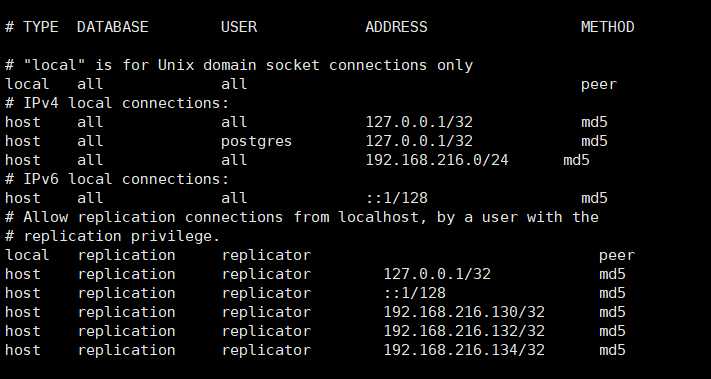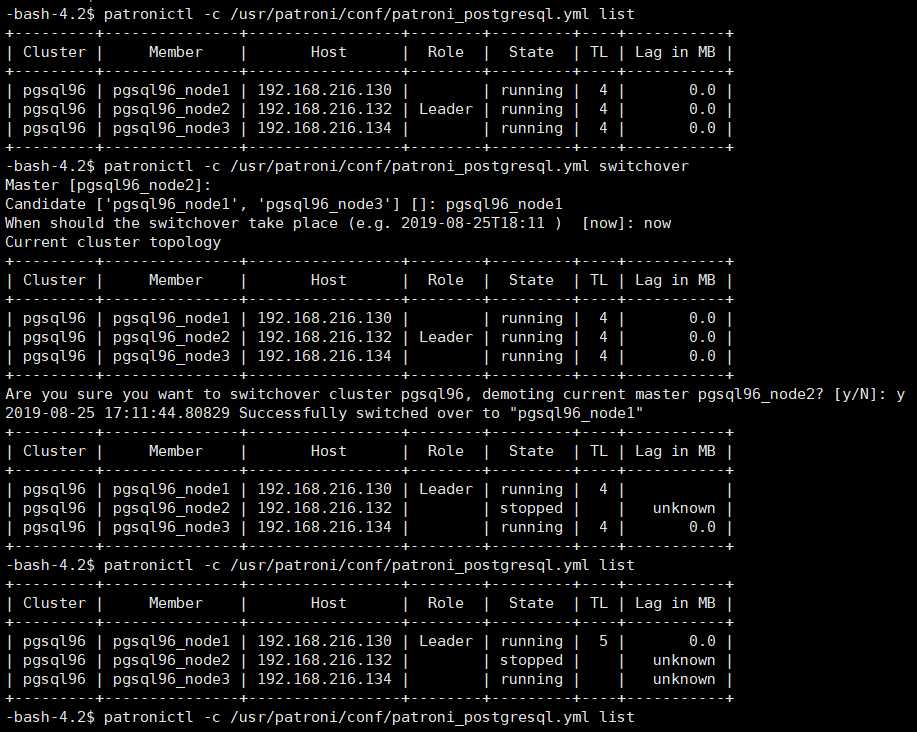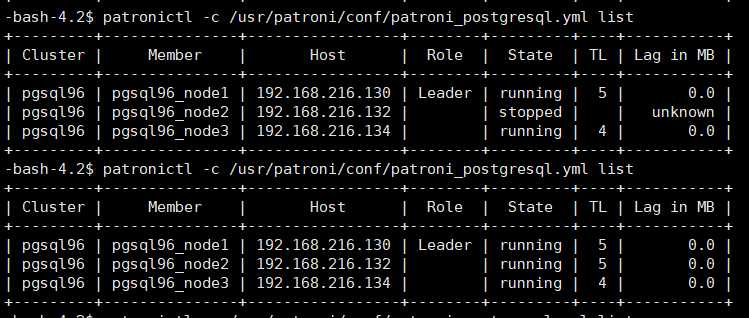centos7部署postgresql集群高可用 patroni + etcd 之patroni篇
Posted caidingyu
tags:
篇首语:本文由小常识网(cha138.com)小编为大家整理,主要介绍了centos7部署postgresql集群高可用 patroni + etcd 之patroni篇相关的知识,希望对你有一定的参考价值。
实验环境:centos7.4纯净版
postgres版本: 9.6.15
etcd版本:3.3.11
patroni版本:
ip规划
192.168.216.130 node1 master
192.168.216.132 node2 slave
192.168.216.134 node3 slave
etcd集群部署请看上一篇文章:https://www.cnblogs.com/caidingyu/p/11408389.html
postgres部署参考文章:https://www.cnblogs.com/virtulreal/p/9921978.html
修改node1中postgresql.conf配置如下
max_connections = ‘100‘ max_wal_senders = ‘10‘ port = ‘5432‘ listen_addresses = ‘0.0.0.0‘ synchronous_commit = on full_page_writes = on wal_log_hints = on synchronous_standby_names = ‘*‘ max_replication_slots = 10 wal_level = replica
修改node1中pg_hba.conf配置如下
[root@localhost data]# more pg_hba.conf|grep -v ^#|grep -v ^$ local all all peer host all all 127.0.0.1/32 md5 host all postgres 127.0.0.1/32 md5 host all all 192.168.216.0/24 md5 host all all ::1/128 md5 local replication replicator peer host replication replicator 127.0.0.1/32 md5 host replication replicator ::1/128 md5 host replication replicator 192.168.216.130/32 md5 host replication replicator 192.168.216.132/32 md5 host replication replicator 192.168.216.134/32 md5

node1上创建复制槽,至关重要,patroni 用到了这个玩意
postgres=# create user replicator replication login encrypted password ‘1qaz2wsx‘; postgres=# alter user postgres with password ‘1qaz2wsx‘; postgres=# select * from pg_create_physical_replication_slot(‘pgsql96_node1‘); postgres=# select * from pg_create_physical_replication_slot(‘pgsql96_node2‘); postgres=# select * from pg_create_physical_replication_slot(‘pgsql96_node3‘);
node2 配置stream replication
systemctl stop postgresql-9.6 su - postgres cd /var/lib/pgsql/9.6/data rm -rf ./* /usr/pgsql-9.6/bin/pg_basebackup -h 192.168.216.130 -D /var/lib/pgsql/9.6/data -U replicator -v -P -R vi recovery.conf recovery_target_timeline = ‘latest‘ standby_mode = ‘on‘ primary_conninfo = ‘host=192.168.216.130 port=5432 user=replicator password=1qaz2wsx‘ primary_slot_name = ‘pgsql96_node2‘ trigger_file = ‘/tmp/postgresql.trigger.5432‘ 执行exit返回root用户 systemctl start postgresql-9.6
node3 配置stream replication
systemctl stop postgresql-9.6 su - postgres cd /var/lib/pgsql/9.6/data rm -rf ./* /usr/pgsql-9.6/bin/pg_basebackup -h 192.168.216.130 -D /var/lib/pgsql/9.6/data -U replicator -v -P -R vi recovery.conf recovery_target_timeline = ‘latest‘ standby_mode = ‘on‘ primary_conninfo = ‘host=192.168.216.130 port=5432 user=replicator password=1qaz2wsx‘ primary_slot_name = ‘pgsql96_node3‘ trigger_file = ‘/tmp/postgresql.trigger.5432‘ 执行exit返回root用户 systemctl start postgresql-9.6
在node1上连接数据库,查看复制状态
select client_addr,pg_xlog_location_diff(sent_location, write_location) as write_delay,pg_xlog_location_diff(sent_location, flush_location) as flush_delay,pg_xlog_location_diff(sent_location, replay_location) as replay_delay from pg_stat_replication;

下载、安装 patroni,如遇网络问题可以多执行几次pip install或者切换其他pip源
yum install gcc yum install python-devel.x86_64 cd /tmp curl https://bootstrap.pypa.io/get-pip.py -o get-pip.py python get-pip.py pip install psycopg2-binary pip install patroni[etcd,consul]
验证是否安装成功
which patroni patroni --help

node1上patroni 配置文件如下,该配置文件需要手动创建
mkdir -p /usr/patroni/conf
cd /usr/patroni/conf/
cat /usr/patroni/conf/patroni_postgresql.yml
scope: pgsql96
namespace: /pgsql/
name: pgsql96_node1
restapi:
listen: 192.168.216.130:8008
connect_address: 192.168.216.130:8008
etcd:
host: 192.168.216.130:2379
bootstrap:
# this section will be written into Etcd:/<namespace>/<scope>/config after initializing new cluster
# and all other cluster members will use it as a `global configuration`
dcs:
ttl: 30
loop_wait: 10
retry_timeout: 10
maximum_lag_on_failover: 1048576
master_start_timeout: 300
synchronous_mode: false
postgresql:
use_pg_rewind: true
use_slots: true
parameters:
listen_addresses: "0.0.0.0"
port: 5432
wal_level: logical
hot_standby: "on"
wal_keep_segments: 1000
max_wal_senders: 10
max_replication_slots: 10
wal_log_hints: "on"
# archive_mode: "on"
# archive_timeout: 1800s
# archive_command: gzip < %p > /data/backup/pgwalarchive/%f.gz
# recovery_conf:
# restore_command: gunzip < /data/backup/pgwalarchive/%f.gz > %p
postgresql:
listen: 0.0.0.0:5432
connect_address: 192.168.216.130:5432
data_dir: /var/lib/pgsql/9.6/data
bin_dir: /usr/pgsql-9.6/bin
# config_dir: /etc/postgresql/9.6/main
authentication:
replication:
username: replicator
password: 1qaz2wsx
superuser:
username: postgres
password: 1qaz2wsx
#watchdog:
# mode: automatic # Allowed values: off, automatic, required
# device: /dev/watchdog
# safety_margin: 5
tags:
nofailover: false
noloadbalance: false
clonefrom: false
nosync: false
node2上patroni 配置文件如下
[root@localhost etcd]# cat /usr/patroni/conf/patroni_postgresql.yml
scope: pgsql96
namespace: /pgsql/
name: pgsql96_node2
restapi:
listen: 192.168.216.132:8008
connect_address: 192.168.216.132:8008
etcd:
host: 192.168.216.132:2379
bootstrap:
# this section will be written into Etcd:/<namespace>/<scope>/config after initializing new cluster
# and all other cluster members will use it as a `global configuration`
dcs:
ttl: 30
loop_wait: 10
retry_timeout: 10
maximum_lag_on_failover: 1048576
master_start_timeout: 300
synchronous_mode: false
postgresql:
use_pg_rewind: true
use_slots: true
parameters:
listen_addresses: "0.0.0.0"
port: 5432
wal_level: logical
hot_standby: "on"
wal_keep_segments: 1000
max_wal_senders: 10
max_replication_slots: 10
wal_log_hints: "on"
# archive_mode: "on"
# archive_timeout: 1800s
# archive_command: gzip < %p > /data/backup/pgwalarchive/%f.gz
# recovery_conf:
# restore_command: gunzip < /data/backup/pgwalarchive/%f.gz > %p
postgresql:
listen: 0.0.0.0:5432
connect_address: 192.168.216.132:5432
data_dir: /var/lib/pgsql/9.6/data
bin_dir: /usr/pgsql-9.6/bin
# config_dir: /etc/postgresql/9.6/main
authentication:
replication:
username: replicator
password: 1qaz2wsx
superuser:
username: postgres
password: 1qaz2wsx
#watchdog:
# mode: automatic # Allowed values: off, automatic, required
# device: /dev/watchdog
# safety_margin: 5
tags:
nofailover: false
noloadbalance: false
clonefrom: false
nosync: false
node3上patroni 配置文件如下
scope: pgsql96
namespace: /pgsql/
name: pgsql96_node3
restapi:
listen: 192.168.216.134:8008
connect_address: 192.168.216.134:8008
etcd:
host: 192.168.216.134:2379
bootstrap:
# this section will be written into Etcd:/<namespace>/<scope>/config after initializing new cluster
# and all other cluster members will use it as a `global configuration`
dcs:
ttl: 30
loop_wait: 10
retry_timeout: 10
maximum_lag_on_failover: 1048576
master_start_timeout: 300
synchronous_mode: false
postgresql:
use_pg_rewind: true
use_slots: true
parameters:
listen_addresses: "0.0.0.0"
port: 5432
wal_level: logical
hot_standby: "on"
wal_keep_segments: 1000
max_wal_senders: 10
max_replication_slots: 10
wal_log_hints: "on"
# archive_mode: "on"
# archive_timeout: 1800s
# archive_command: gzip < %p > /data/backup/pgwalarchive/%f.gz
# recovery_conf:
# restore_command: gunzip < /data/backup/pgwalarchive/%f.gz > %p
postgresql:
listen: 0.0.0.0:5432
connect_address: 192.168.216.134:5432
data_dir: /var/lib/pgsql/9.6/data
bin_dir: /usr/pgsql-9.6/bin
# config_dir: /etc/postgresql/9.6/main
authentication:
replication:
username: replicator
password: 1qaz2wsx
superuser:
username: postgres
password: 1qaz2wsx
#watchdog:
# mode: automatic # Allowed values: off, automatic, required
# device: /dev/watchdog
# safety_margin: 5
tags:
nofailover: false
noloadbalance: false
clonefrom: false
nosync: false
手动启动 patroni
node1、node2、node3 三个节点依次启动
patroni /usr/patroni/conf/patroni_postgresql.yml
查看 patroni 集群状态
克隆一个窗口,执行patronictl -c /usr/patroni/conf/patroni_postgresql.yml list

查看 etcd 的 信息
etcdctl ls /pgsql/pgsql96

etcdctl get /pgsql/pgsql96/members/pgsql96_node1

为了方便开机自启,故配置成 patroni.service,3个node都需要进行配置
[root@localhost data]# vi /etc/systemd/system/patroni.service [root@localhost data]# cat /etc/systemd/system/patroni.service [Unit] Description=patroni - a high-availability PostgreSQL Documentation=https://patroni.readthedocs.io/en/latest/index.html After=syslog.target network.target etcd.target Wants=network-online.target [Service] Type=simple User=postgres Group=postgres PermissionsStartOnly=true ExecStart=/usr/bin/patroni /usr/patroni/conf/patroni_postgresql.yml ExecReload=/bin/kill -HUP $MAINPID LimitNOFILE=65536 KillMode=process KillSignal=SIGINT Restart=on-abnormal RestartSec=30s TimeoutSec=0 [Install] WantedBy=multi-user.target
禁止 postgresql 的自启动,通过 patroni 来管理 postgresql
systemctl status patroni systemctl start patroni systemctl enable patroni systemctl status postgresql systemctl disable postgresql systemctl status etcd systemctl enable etcd
如何切换Leader
执行patronictl -c /usr/patroni/conf/patroni_postgresql.yml switchover

多执行patronictl -c /usr/patroni/conf/patroni_postgresql.yml list进行刷新,可以看到Leader由node2切换为node1

以上是关于centos7部署postgresql集群高可用 patroni + etcd 之patroni篇的主要内容,如果未能解决你的问题,请参考以下文章